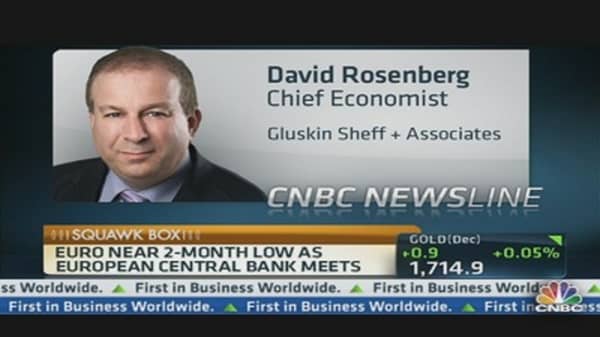All the problems investors face—from a fiscal meltdown to the various economic woes around the world—add up to one daunting prospect: Another possible recession just over the horizon.
As the financial world puts Tuesday's presidential election behind it, the light in the tunnel could be an economic freight train.
Slowing corporate profits, the remnants of Superstorm Sandy and the ramifications of the "fiscal cliff" in Washington are expected to result in at least two quarters of slow or no growth that could make investing even trickier than it was during the ups and downs of 2012.
"The other overriding problem is we never really gained true escape velocity this cycle," David Rosenberg, economist and strategist at Gluskin Sheff in Toronto, told CNBC. (Read More: CEOs to Washington: Get a 'Fiscal Cliff' Deal Done)
That "escape velocity" refers to the strength an economy shows in which it catapults itself out of a tight range of growth and can withstand shocks such as those posed in the U.S.
As Rosenberg pointed out, the economy in the late 1980s was able to tolerate the Black Monday stock market crash, while the late 1990s strength was enough to fend off the Asian crisis.
With current U.S. gross domestic product growth at just 2 percent, that's not enough to battle through problems as steep as the fiscal cliff of tax increases and spending cuts, as well as storm damage and weakness in global markets.
"There's no question that if we get the fiscal cliff that we're going to get recession next year," Rosenberg said. "The only question is how deep."
Rosenberg is not alone: Strategas earlier this week said it expects a recession early in 2013, and University of Maryland economist Peter Morici said that "the President and Congress will not be able to raise taxes — be those on the wealthiest of the wealthy or anyone else — and cut spending without risking a second recession, deeper and more painful than the Great Recession."
Even if the cliff gets fixed, that in itself will mean the economy will slow even further.
Any remedies indeed will include higher taxes and spending cuts, though likely less than those prescribed by law if Congress fails to act on the current menu that will take place automatically unless deficit-reduction targets are hit.
The best hope is that the warring Washington factions can come up with something at least somewhat palatable to investors. (Read More: Fixing 'Fiscal Cliff' Will Mean 'High, Higher' Taxes: Gross)
"There's something to be said about getting ahead of the problem and preventing the fiscal side from being increasingly structural over time," Rosenberg said. "It's going to make the painful resolution that much more painful down the road."
From the market's standpoint, investors are likely to weather a recession by moving to more basic strategies and perhaps taking some money off the table.
"As far as people I talk to in the real world, they want to let the dust settle just to see what's going to happen," said Nadav Baum, executive vice president at BPU Investment Management in Pittsburgh. "There's a little trepidation of where we are headed, what the tax structure's going to be."
Wall Street has recoiled since President Barack Obama won a second term following the hotly contested election in which Republican Mitt Romney painted the incumbent as anti-business. Stocks plunged more than 2 percent Wednesday and were off again Thursday afternoon, though not as steeply. (Read More: Stocks Fall as Fiscal Cliff Worries Linger)
Interestingly, one of the areas thought most vulnerable to an impending tax hike was outperforming the broader market.
Taxes on dividends are almost certain to increase from their current 15 percent level, but an exchange-traded fund that tracks the group, the iShares Dow Jones Select Dividend Index Fund, was off only narrowly.
"The reality is that 60 percent of market return is dividend," Baum said. "So I'm a dividend buyer. If it means taxes are going higher, so be it."
Investors overall have taken a cautious approach to the market, and a looming recession likely will only exacerbate an unwillingness to commit money.
In the week prior to the election, investors pulled cash both from stocks and bonds. Equity-based mutual funds lost $1.4 billion while bond funds saw outflows of $895 million, according to Lipper fund flow data.
Continued accommodation from Federal Reserve monetary policy has been the antidote to fear of risk. (Read More: Why Stocks May Keep Falling: 'The Sugar High Will End')
This week's market drop "does reflect real worry about the fiscal cliff" but "we view this as anxiety as an opportunity to buy, not sell," said Bernard Baumohl, chief global economist at the Economic Outlook Group.
"Both the real economy and the stock market will be comforted by a continuation of current monetary policy as well as credible signs in the days ahead that the White House and Congress are making progress to avoid a fiscal cliff dive," he added.
Tony Dwyer, equity strategist at Canaccord Genuity, reiterated a 1,650 price target for the Standard & Poor's 500 for 2013, advising investors to "use any weakness, or strength, to add to our favored sectors." They include consumer discretionary, information tech, financials and industrials.
Rosenberg, of Gluskin Sheff, warned investors not to get too daring in their choices, Fed policy or not.
"We have a situation where the range of outcomes is extremely wide," he said. "What that tells me from an investing standpoint is that we have to be fully diversified right now. I would not be taking concentrated bets across any asset class."
For Baum, the most important thing for investors to watch is not letting their emotions overcome their choices. He thinks Washington will come to a resolution that, at some point, will placate markets.
"You can't keep kicking things down the road," he said. "Once you get more certainty you get markets that will react and act more like markets, as opposed to emotional roller coasters."




